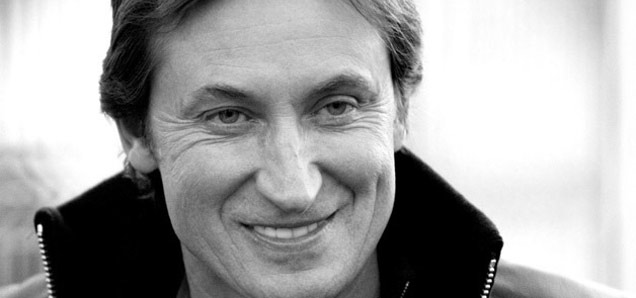The Real World: The best and worst in media relations
 CREDIT: CANADASWALKOFFAME.COM
CREDIT: CANADASWALKOFFAME.COMWayne Gretzky: a true gentleman.
I'm betting that the most enjoyable part of your studies here at Fanshawe College is forming new friendships. As a professor, it's great to see how a class becomes a family as the semester progresses. In fact, the same holds true in the real world: it's a lot easier tackling the ups and downs of career advancement when you surround yourself with great people.
When asked what I love most about my job as a professional communicator, I always say the same thing: meeting new people and forming friendships. Of course, not every meet and greet results in an exchange of Christmas cards. Amongst the thousands of introductions I've encountered over the past three decades, there have been plenty of personality clashes, for one reason or another. But that's the chance you take when you work in communications — or any profession, for that matter.
I wrote in this column last week about my first feature interview as a reporter with Fanshawe's student radio station CIXX-FM. In September 1981, Wayne Gretzky was fresh off a Canada Cup series and nursing an injury, and was not supposed to practice with his Edmonton Oilers teammates at the old London Gardens. But he surprised most in attendance when he skated for two hours, then tried to sneak out the side door to a waiting sports car headed to his hometown of Brantford.
Thinking that I had missed out on chatting with The Great One, I walked through the Oilers' dressing room looking for a puck or a stick (at 19 years old, I was still star-struck and had not yet morphed into a cynical reporter). Hiding in the corner of the dressing room from hundreds of screaming girls was Gretzky. I stuttered when asking 'Mr. Gretzky' for an interview. He said he was in a hurry to visit his folks, but asked for a pen and paper. He wrote down his parents' phone number, and asked me to call him in one hour (that was one fast sports car). To my surprise, Walter Gretzky picked up the phone, handed it to Wayne and I conducted my first feature-length interview. To this day, Gretzky is all about class.
That kind gesture from Gretzky made a huge impression on a young student reporter. Unfortunately, I've been involved in many contrasting situations, including one with Major League Baseball's all-time home run king, Barry Bonds.
In 1991, I was in Pittsburgh to cover a Pirates home stand and interview a much skinnier — but still a potential hall of famer — Bonds. He was surly at best, refusing to talk with me despite the fact that the ballclub's media relations team had arranged a meeting. For that entire home stand, Bonds put me off, finding one excuse after another and laughing as he said no to my requests. I didn't get the interview, but with camera in hand on a Sunday afternoon, I took some memorable photos.
Those two examples demonstrate the best and the worst of media relations, and they mirror most other careers involving interaction with fellow employees and clients. Although one can never assume you know everything about someone and what is going on in their life (maybe Bonds wasn't sleeping well that week, but I doubt it), all that is needed to ensure there is no mystery surrounding less-than-acceptable behaviour is open communication. And yet, despite the fact we live in an unprecedented time of communications, the art of communicating is, at times, sadly missing.
Communicating is not always a black and white issue. Case in point: my long-time relationship with Canada's greatest golfer of all time, Mike Weir. I've followed the 2003 Masters champion's career since he played on the local Junior Tyson Tour, have befriended him and his brother-turned-agent, Jim, and have participated in his special events and fundraisers. We've spent time together on the golf course during both charity and PGA Tour events, and have always enjoyed a great working relationship.
At the RBC Canadian Open Championship in Hamilton this summer, Weir and I spent some quality time on the range, and in the media tent talking about his game, his business ventures (including his fabulous wine out of Niagara) and our families. Yet on the Friday, when Weir missed the cut, he was rude to me and the entire scrum surrounding him at the scorer's tent. Here was Canada's greatest golfer — our game's top ambassador — offering us about a minute of his time before leaving the course. It wasn't right, and, despite our friendship, I wrote about it.
Weir and I are still friends. He understood I had a job to do, and I understood he was under a lot of pressure to perform. The key here was proper communication. Its power should never be underestimated.
Award-winning journalist Jeffrey Reed is a Fanshawe College professor with the Corporate Communication and Public Relations post-graduate program and an instructor with Fanshawe's Continuing Education department. E-mail him at jreed@fanshawec.ca.













